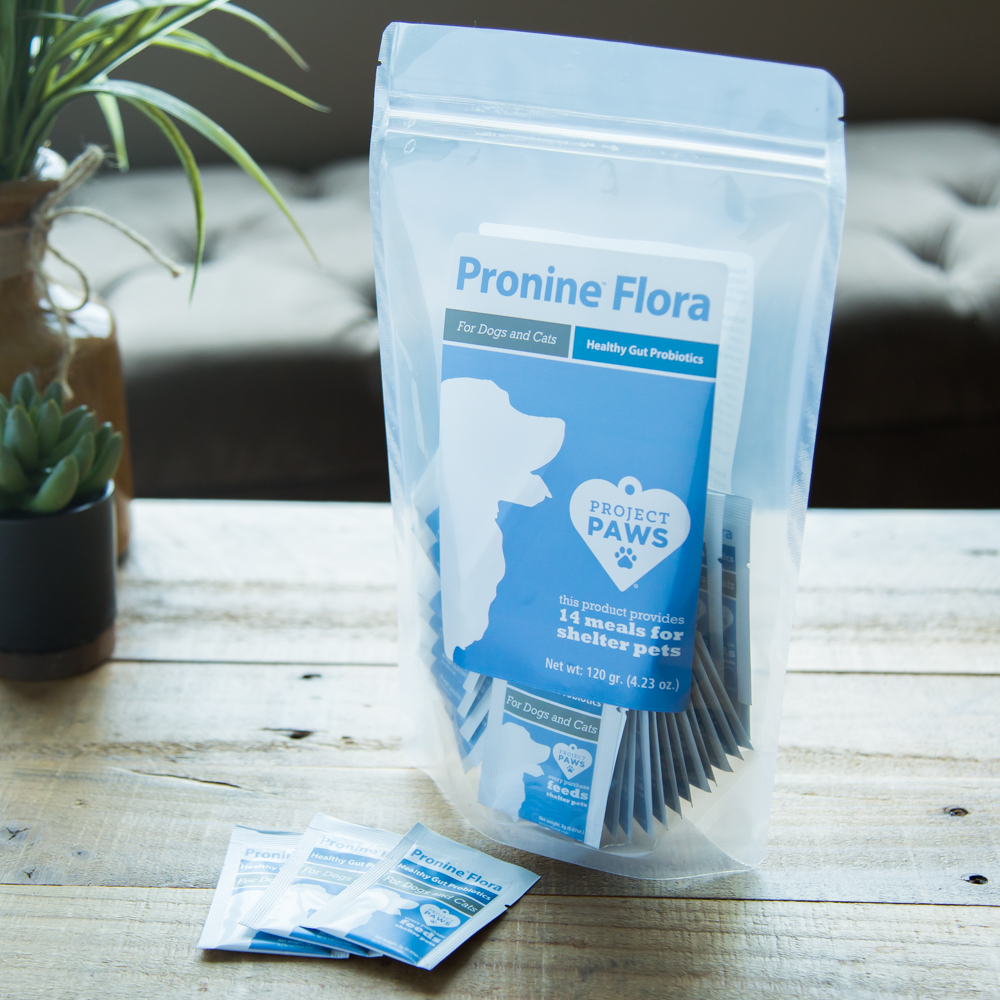
The idea of millions of tiny microbes living in your dog’s digestive system can turn your own stomach queasy, but those little organisms have a big job to do. They’re called probiotics, and they’re found in every animal—humans and dogs included. Probiotics are the “friendly’ bacteria and yeasts that balance the bad bacteria and help the body operate smoothly. We’ve known for generations that probiotics are important for human health, but research is now showing they’re just as important for dogs. Here are a few ways supplementing your dog’s diet with probiotics can help their overall health.

1. Ease Chronic GI Conditions
For dogs with chronic GI conditions, a stomach ache isn’t just a stomach ache. They suffer from regular diarrhea, vomiting, constipation, and intense abdominal pain. GI conditions also lead to dehydration, weight loss, and malnutrition.
There are several different types of GI conditions including colitis, small intestinal malabsorption, and acute gastroenteritis. What they all have in common is that they’re related to the disruption of the delicate balance of microorganisms in the gut. Research suggests supplementing a dog’s diet with probiotics helps relieve symptoms of GI issues. It’s not a cure, but it can help bring a dog’s digestive system back into balance so it can better do its job.
2. Relieve Digestive Issues Caused by Stress
Chronic GI conditions aren’t the only causes of upset stomachs. Like people, many dogs suffer digestive issues during stressful situations. When your pup’s brain is focused on something stressful, the central nervous system essentially shuts down important digestive processes. Chemical secretions needed to digest food slow down, digestive muscles contract in ways they shouldn’t, and the colon can cause diarrhea and constipation. It brings a whole new meaning to a “gut-wrenching” situation. For dogs that get stressed easily, probiotics can help keep their digestive systems in check.

3. Alleviate Gas
Having gas is usually normal for dogs, but if your pup regularly clears the room because of his excessive and noxious flatulence, he might need more probiotics in his diet. According to Vet West Animal Hospitals, a change in diet and eating a diet that’s hard to digest are two of the most common causes of excessive gas in dogs. Some dogs are even lactose intolerant and get especially gassy if they’re fed milk or dairy products.
Not only is your dog’s gas offensive to your nostrils, it also makes your dog feel uncomfortable and generally down in the dumps. Probiotics bolster the number of good bacteria in your dog’s gut to help the system digest food more efficiently. When your dog’s digestive system is operating at its best, they’re less likely to pass gas.
4. Reduce Allergic Reactions
You already know your dog’s gut is in charge of digestion, but that’s not all it does. PetMd reports 70% of your dog’s immune system resides in their gut, and that makes the digestive tract the largest immune organ in a dog’s body. The immune system is responsible for fighting off illnesses and destroying bad bacteria. It’s a valuable defense system, but it isn’t perfect.

Allergies are the result of the immune system overcompensating and misidentifying something harmless—like grass or peanuts—as something dangerous. When that happens, allergic reactions include everything from itching, sneezing, and runny eyes to vomiting and diarrhea. Because the gut and the immune system are closely linked, having a well-balanced microbiome in the digestive tract can help keep the immune system from producing harmful reactions. More good bacteria in the gut won’t cure your dog’s allergies, but probiotics can help reduce allergic reactions.
5. Promote Healthy Skin and Fur
When your dog is healthy on the inside, they start showing it on the outside. Probiotics can help dogs suffering from dry, itchy skin and dull, rough fur. Sometimes dogs have a genetic predisposition for sensitive skin, and countless dogs suffer from regular skin allergies. They spend their days scratching and biting, and they deal with hair loss and frequent sores.
Doggy’s Digest says,
“Probiotics offer effective, gentle relief for dogs suffering skin allergies by restoring balance to bacteria levels in the GI tract which can directly and significantly improve immune system functioning.”
When your dog isn’t scratching and biting their skin to find relief from allergies, their skin starts to heal. Healthy skin then leads to healthy fur. Before you know it, your dog is looking better than ever.
Find the Right Probiotic for Your Dog
To make sure your dog experiences all these benefits, you need to find the right probiotic supplement. Pronine™ Flora from iHeartdogs is a 4-in-1 formula that restores digestive balance. It includes probiotics, prebiotics, digestive enzymes, and gut-soothing herbs in a combination that’s been proven to help dogs thrive. It’s designed as a powder to make serving it to your dog extra easy, and one dosage a day will keep their gut healthy and happy. The best part is, every time you buy Pronine™ Flora, you provide meals for 14 shelter dogs. It doesn’t get better than that.
Sources: Doggy’s Digest, PetMd, Vet West Animal Hospitals. Veterinary Medicine and Science
These statements have not been evaluated by the Food and Drug Administration. This product is not intended to diagnose, treat, cure, or prevent any disease. The information on this website is not intended to replace a one-on-one relationship with a qualified healthcare professional.
The post 5 Ways Probiotics Can Help Your Dog appeared first on iHeartDogs.com.
via Whisker Therapy
